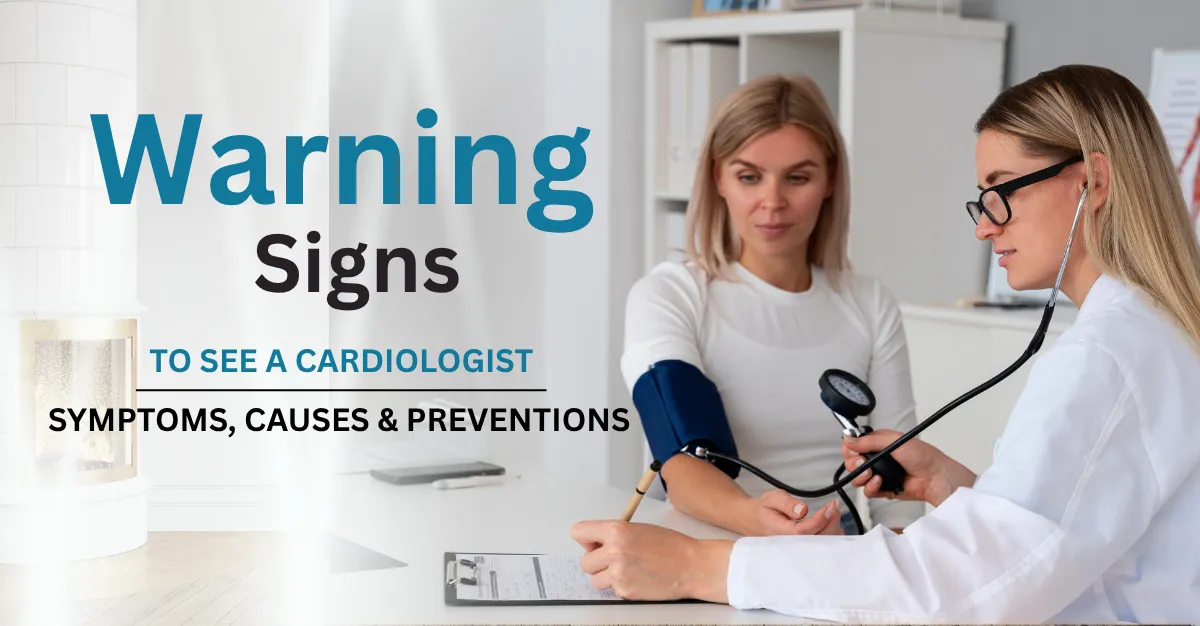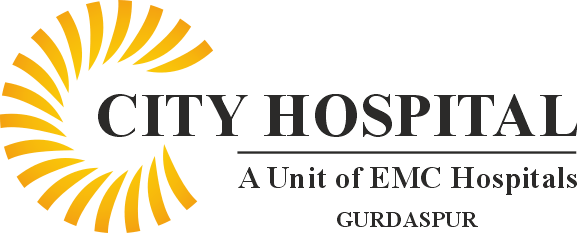Warning Signs to See a Cardiologist – Protect Your Heart Health Today

- July 11, 2025
- City Hospital
Heart disease remains one of the leading causes of death globally, claiming millions of lives each year. Often referred to as the “silent killer,” cardiovascular conditions can progress without obvious symptoms until a life-threatening event occurs. Therefore, understanding when to see a cardiologist is vital for protecting your heart health. This comprehensive guide delves into the warning signs that necessitate a cardiologist visit, along with symptoms, causes, diagnosis, treatment options, and prevention strategies.
When our heart starts giving off warning signs, It’s important to pay attention. Cardiovascular disease is one of the top causes of death globally, and the scary part is, Many people miss the early symptoms. That’s why recognizing these signs early and taking them seriously can make all the difference — even save your life.
The truth is, most people wait too long before consulting a heart specialist. Understanding the early warning signs and knowing when to seek expert advice can literally be the difference between life and death. So, Knowing the signs to see a cardiologist can make a life-saving difference.
Common Risk Factors You Shouldn’t Ignore
Cardiovascular disease doesn’t just strike out of nowhere. Often, it’s a slow burn, ignited by lifestyle choices, genetics, and underlying health conditions.
Family History of Heart Disease
If heart disease runs in your family, don’t wait for symptoms. Genetics can predispose you to coronary artery disease, arrhythmias, and high blood pressure. A cardiologist can help assess your risks even if you feel healthy.
High Blood Pressure (Hypertension)
They call it the “silent killer” for a reason. High blood pressure rarely has symptoms until it’s done significant damage. Regular monitoring and consultation with a cardiologist can keep things under control before they spiral.
High Cholesterol Levels
Excess cholesterol can lead to blocked arteries, which restrict blood flow and increase the risk of heart attacks. A cardiologist can suggest medications or lifestyle tweaks to get your levels back on track.
Diabetes or Prediabetes
Diabetes doesn’t just affect your blood sugar—it seriously increases your chances of heart problems. Cardiologists often work closely with endocrinologists to manage this risk.
Smoking and Alcohol Consumption
Tobacco and excessive alcohol are toxic for your heart. If you smoke or drink heavily, even in the absence of symptoms, you should see a cardiologist to evaluate your heart health.
Obesity or Sedentary Lifestyle
Carrying extra weight puts extra pressure on your heart. If you’re not getting enough exercise or are struggling with weight gain, a cardiologist can help set you on a healthier path.
Understanding the Role of a Cardiologist
A cardiologist is a specialist in diagnosing and treating conditions related to the cardiovascular system—which includes the heart, arteries, veins, and capillaries. They’re trained to identify subtle signs of disease that general practitioners may miss. Whether you’ve already experienced a heart attack, have a family history of heart disease, or are experiencing strange symptoms, a cardiologist can guide you through preventive care, early detection, and life-saving treatments. Think of them as the first line of defense in protecting your most vital organ.
Symptoms That Require a Cardiologist
When it comes to heart health, ignoring warning signs can be fatal. Cardiologists specialize in diagnosing and treating disorders of the heart and blood vessels, and there are several key symptoms that indicate it’s time to seek their help.
Persistent Chest Pain
This is one of the most recognized symptoms of heart trouble. This pain may feel like pressure, squeezing, or burning. While it may sometimes be caused by acid reflux or muscle strain, recurrent or intense pain may signal angina or even a heart attack.
Shortness of Breath
Especially during mild physical activity or while lying down, is another major symptom. It may be a sign of heart failure or valve issues that require medical evaluation.
Palpitations or Irregular Heartbeats
where your heart feels like it’s skipping a beat or fluttering, could suggest arrhythmias. Some arrhythmias are benign, but others may increase stroke risk or lead to heart failure.
Fatigue and Weakness
Even after getting adequate rest, is another subtle but serious warning. It often reflects that your heart isn’t pumping effectively, depriving muscles and tissues of oxygen.
Swelling in the Legs or Ankles
E(edema) could indicate fluid retention from poor circulation—a sign your heart may not be functioning properly.
Dizziness or Fainting (Syncope)
Eespecially if unexplained, may result from insufficient blood flow to the brain, due to arrhythmias or other heart conditions.
These symptoms should never be ignored. If you’re experiencing any of them, a cardiologist can conduct diagnostic tests like EKGs, echocardiograms, or stress tests to determine the root cause and start appropriate treatment.
Causes That Lead to Cardiologist Visits
Understanding the root causes that lead people to visit a cardiologist can help prevent the development of serious heart conditions. Many of these causes build up silently over time and are influenced by lifestyle, genetics, or pre-existing health conditions.
Hypertension (High Blood Pressure)
This is a leading cause. It forces the heart to work harder, damaging arteries and increasing the risk of heart attacks, strokes, and heart failure. Because it often shows no early symptoms, it’s known as the “silent killer.”
High Cholesterol Levels
This is a leading cause. It forces the heart to work harder, damaging arteries and increasing the risk of heart attacks, strokes, and heart failure. Because it often shows no early symptoms, it’s known as the “silent killer.”
Diabetes
This desease Significantly increases the risk of cardiovascular disease. High blood sugar levels damage blood vessels and nerves controlling the heart.
Obesity and Sedentary Lifestyle
These are major contributors. Excess weight increases strain on the heart and leads to metabolic syndromes like insulin resistance and high cholesterol.
Smoking and Excessive Alcohol Consumption
These are toxic to your cardiovascular system. Smoking reduces oxygen in your blood and thickens the blood, increasing the chances of clots. Alcohol, when consumed in large amounts, weakens heart muscle and leads to arrhythmias.
Genetics and Family History
This also play a significant role. If heart disease runs in your family, your chances of developing a condition increase—sometimes regardless of lifestyle.
Chronic Stress
This is an underestimated cause. Stress raises your blood pressure and heart rate, and chronic stress contributes to inflammation and arterial damage over time.
These causes, especially when combined, create a perfect storm for heart disease. A cardiologist is trained to assess all these risk factors holistically and recommend individualized treatment and lifestyle plans.
Prevention and When to Consult a Cardiologist
Preventing heart disease and maintaining optimal cardiovascular health is possible with the right approach. Prevention is always better than cure, and it starts with being proactive rather than reactive.
Get Regular Screenings: Starting in your 30s or earlier if you have risk factors, you should get regular checkups to monitor blood pressure, cholesterol levels, and glucose. Early detection saves lives.
Maintain a Heart-Healthy Diet: Eat plenty of fruits, vegetables, whole grains, lean proteins, and healthy fats like omega-3s. Avoid trans fats, processed foods, excessive sodium, and sugary beverages.
Exercise Regularly: Aim for at least 150 minutes of moderate aerobic exercise each week—walking, swimming, or cycling are excellent for heart health. Even short bursts of activity can have a major impact.
Quit Smoking: There’s no safe level of tobacco consumption. Quitting smoking significantly reduces your risk of heart attack and stroke.
Limit Alcohol Intake: While moderate consumption may have some heart benefits, too much alcohol raises blood pressure and leads to irregular heart rhythms.
Manage Stress: Chronic stress contributes to hypertension and arterial damage. Yoga, meditation, deep breathing, or hobbies can help reduce its impact.
Watch for Warning Signs: If you experience symptoms like chest discomfort, shortness of breath, unexplained fatigue, or irregular heartbeat—even occasionally—schedule a visit with a cardiologist.
Consult with Our Heart Specialist Today
Your heart deserves expert care. Don’t ignore the signs—even mild shortness of breath, unexplained fatigue, or palpitations could be your body’s way of asking for help. At City Hospital, our experienced cardiologists offer comprehensive heart evaluations using state-of-the-art diagnostics and personalized care plans. Whether it’s your first checkup or you’re managing an existing condition, we’re here for you.
Book a consultation today and take the first step toward protecting your heart health.

FAQs (Frequently Asked Questions)
The earliest signs may be subtle and easy to ignore—like feeling unusually tired, shortness of breath during routine activities, or chest tightness. You might also notice palpitations, swelling in your feet, or even frequent dizziness. These signs could indicate that your heart isn’t functioning properly and should not be overlooked. A cardiologist can help diagnose the root cause and prevent further complications.
Absolutely. While shortness of breath can stem from lung issues or even anxiety, it’s also a major red flag for heart conditions such as congestive heart failure, valve problems, or coronary artery disease. If you’re gasping for air after climbing a flight of stairs or while lying down at night, it’s time to see a cardiologist.
A cardiologist may begin with a detailed medical history and physical examination, followed by diagnostic tests such as:
Electrocardiogram (ECG) to check heart rhythms
Echocardiogram to examine the heart’s structure
Stress tests to see how your heart performs under exertion
Blood tests for cholesterol, enzymes, and more
CT scan or cardiac catheterization in complex cases
These tools help the cardiologist identify issues and recommend appropriate treatments.
While genetics do play a role, heart disease is largely preventable through lifestyle modifications. Avoiding tobacco, eating a balanced diet, staying physically active, controlling stress, and managing conditions like diabetes or high blood pressure can significantly reduce your risk. Even if you have a family history, regular screenings can catch issues early—before they become dangerous.
Search Keywords
